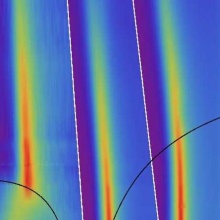Keywords: Quantum Criticality, Heavy Fermions, Spin Dynamics, Electron Spin Resonance (ESR), Broadband ESR, Ultralow Temperatures, Microwave Spectroscopy
Electron spin resonance (ESR) is a microwave spectroscopy technique that allows direct access to spin dynamics in solids. In this project, we want to use ESR to study the unconventional properties of heavy-fermion materials close to a quantum critical point. Heavy-fermion metals have mobile electrons with extremely high effective mass, which form due to hybridization with localized electrons from magnetic ions (like Ce or Yb) that are constituent part of the materials’ crystal lattice. This interplay of localized and free electrons leads to unique metallic states closely related to magnetism. Suppressing magnetic order in a heavy-fermion material, e.g. by applying a magnetic field, can cause quantum criticality (due to a quantum phase transition at zero temperature) with novel material properties that are at the focus of current research. In this project, we want to apply unique microwave techniques that we have developed in recent years to the specific case of quantum criticality in heavy fermions. In contrast to conventional ESR methods, we can use our approaches to probe extremely wide ranges of ESR frequency and thus ESR magnetic field and they work down to extremely low temperatures of 20mK. This allows us to fully probe the various regimes of the relevant phase diagrams that include magnetic order, quantum criticality, and Fermi liquid behaviour. This project thus gives insights into various fundamental concepts of solid state physics, and it introduces experimental techniques that combine microwave technology with ultra-low temperatures.

Marc Scheffler
Dr.Senior scientist

Martin Dressel
Prof. Dr. rer. nat.Head of Institute



